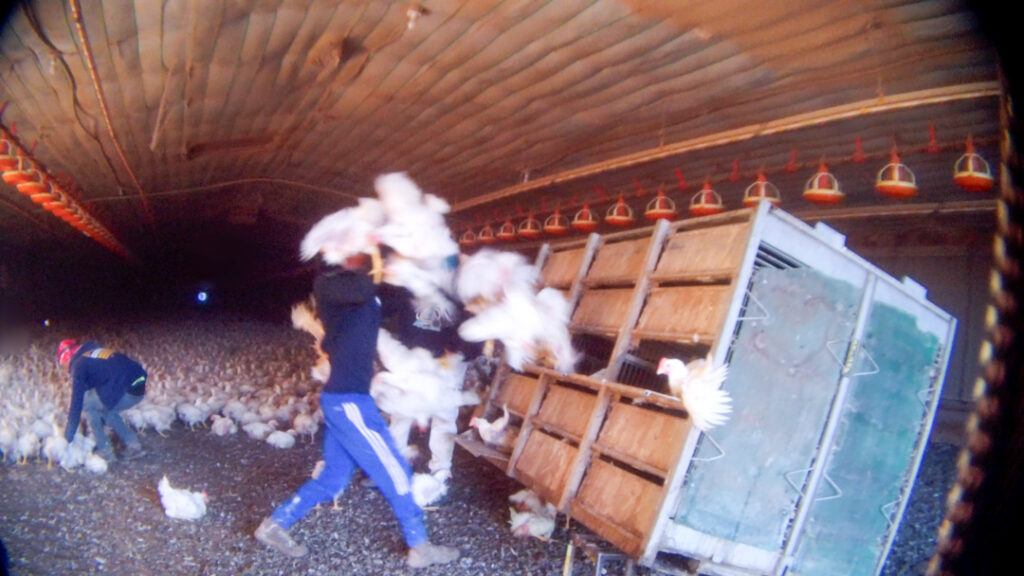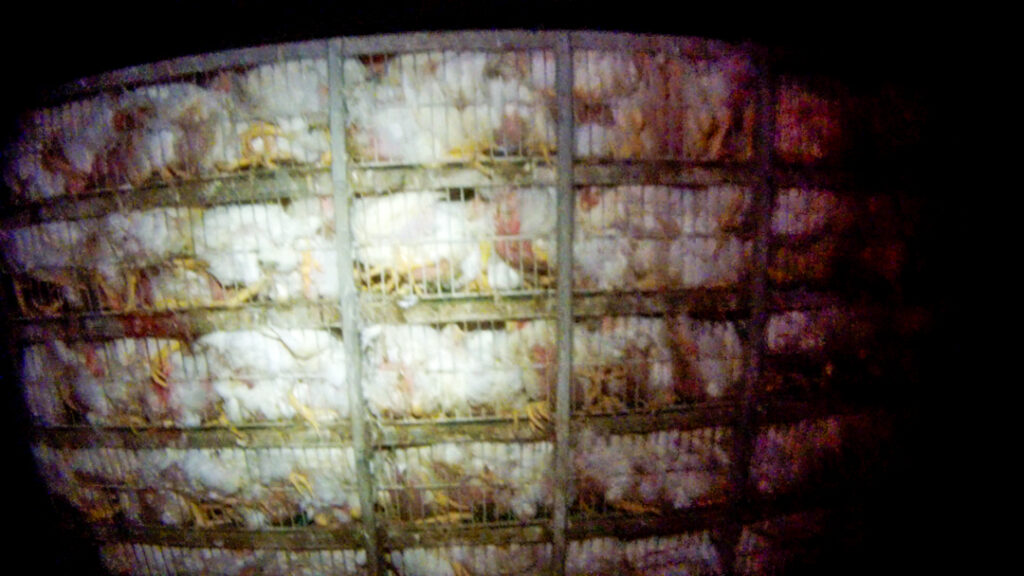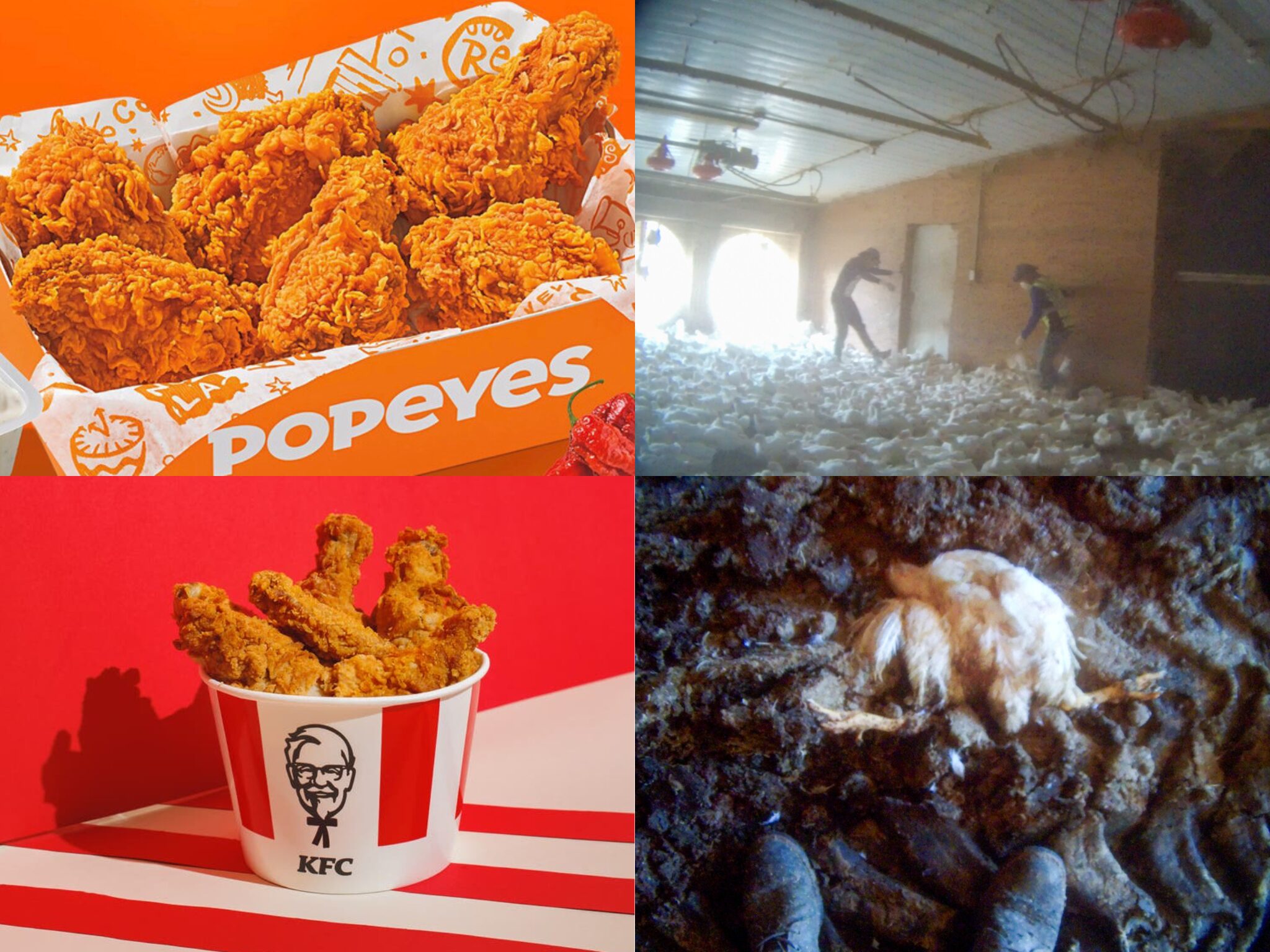As Kentucky Mulls Over Ag-Gag Bill, Footage Shows Animal Cruelty at KFC Supplier Pilgrim’s Poultry Farm
8 Mins Read
Lawmakers in Kentucky are hoping to amend a law that would effectively criminalise whistleblowing and protect industrial livestock farming companies – but a new investigation into Pilgrim’s Pride chicken farms shows exactly why the ‘ag-gag’ legislation needs to be aborted.
The livestock lobby in the US seems to be in full swing. As several states look to ban cultivated meat, academics are tapped to discredit alternative proteins, and industry groups fund education schemes to influence school teachers and students, there’s a lot riding in a year that has been dubbed the climate election year.
In Kentucky, policymakers are taking a different approach, going on the offensive to be defensive of the industrialised meat sector. In what is called an ag-gag law, both houses have approved a measure that would criminalise unauthorised recording or photography at concentrated animal feeding operations (CAFOs) – essentially dealing a blow to whistleblowers who expose health and safety hazards in the food industry.
But a new investigation from animal rights charity Mercy For Animals shows just how important it is to curtail the legislation. It has released footage displaying the cruelty that goes on behind the scenes at the poultry farms of Pilgrim’s Pride, which supply popular fast-food chains, from KFC (famously also from Kentucky) to Popeyes.
What is Kentucky’s ag-gag bill?

Sponsored by Republican senator John Schickel, SB 16 looks to amend a trespassing law from 2018, which aimed to protect “key infrastructure assets” like energy and drinking water facilities from surveillance by unauthorised drones.
This bill, however, seeks to extend these rules to CAFOs – numbering 150 in the state as of 2022 – and commercial food manufacturing and processing facilities (like meatpacking plants). And this time, it’s not just drones – SB 16 aims to restrict any photography or filming of these sites, making it a Class B misdemeanour sustainable by up to 90 days in jail and/or a $250 fine for a first offence.
“Ag-gag legislation, like Kentucky’s SB 16, draws support from industry giants, like Tyson, who do not want the public to see what goes on in their facilities,” Alex Cerussi, senior state policy manager at Mercy For Animals, tells Green Queen. Schicker has explicitly said that the bill was introduced to protect companies like Tyson Foods – you know, the same company that refused to shut down its meatpacking plants during Covid-19 and led to over 1,000 workers contracting the virus, which spread across the local community.
“The problem is that there’s unauthorized drone access over our facilities,” said Tyson Foods government affairs manager Graham Hall, who testified in favour of the bill. “A narrative can be created that’s problematic for us.” It’s almost incredible how transparent this effort is about safeguarding the business of meat producers. Tyson Foods is concerned about problematic narratives and has spent over $42,000 since January 2023 in lobbying government officials to bat for the company against any scrutiny of its operations.
The bill will now need to be voted on the House and Senate floors before it reaches governor Andy Beshear’s desk for consideration, but critics note that this violates free speech and removes a crucial tool for the press and animal advocates to hold corporations accountable. “Ag-gag laws seek to keep the public in the dark about where their food comes from,” says Cerussi. “The industry does not want the public knowing how animals and farmworkers are often treated.”
Michael Abate, an attorney for the Kentucky Press Association, told the Courier Journal: “We’re very concerned about this bill, which would purport to make it a crime to engage in basic newsgathering activities if there are stories related to food processing companies and their facilities.
Ag-gag laws have been deemed unconstitutional in at least five states – North Carolina, Kansas, Idaho, Utah and Wyoming. “It just doesn’t seem like smart policy to pass something that’s been found unconstitutional more often than not,” Todd Blevins, Kentucky state director of the Humane Society of the United States, told the Kentucky Lantern.
Mercy For Animals’ investigation into Pilgrim’s Pride

An investigator for Mercy For Animals visited 23 contract farms belonging to Pilgrim’s Pride, the second-largest poultry company in the US, whose resulting footage shows why Kentucky’s pro-livestock bill needs to be voted against.
The farms had between three to eight broiler houses, each of which held between 25,000 and 38,000 birds – research has shown that most (if not all) chickens in the US are factory-farmed in such CAFOs. The chickens at Pilgrim’s Pride farms have been described as ‘Frankenchickens’ – they’re selectively bred to grow unnaturally large, and fast. The company raises about a billion of these birds each year.
Hidden camera footage shows the chickens being kicked, stomped on, and thrown against the metal walls of the barns. Many are picked up by their legs, necks or wings and thrown several feet through the air into transport cages while already injured or in pain. Tens of thousands of these chickens are crammed into sheds and forced to live for weeks in their own waste, while severely sick and injured birds are bred to grow so large and so fast, they can’t support their own weight.
The investigation found that workers often carried seven chickens at a time and swung them all into transport cages together, while in many instances, transport cage doors were slammed shut, trapping chickens’ heads, wings and legs in the gaps. These cages have 15 compartments and employees – who are likely incentivised to catch chickens fast as they’re paid per chicken, not hour – were supposed to put 21 chickens into each, but the footage shows that they intentionally exceeded that limit often.
Even more alarmingly, chickens were mishandled for non-work-related purposes too. Some birds were carried outside the barn and placed on the driver’s seat of a forklift, for example. And in one instance, a worker held two chickens by their necks – one in each hand – slammed them against the wall, and moved their heads as though they were pecking each other.
“Pilgrim’s is falling behind on addressing enormous suffering in its chicken supply chain,” says Cerussi. “The company could significantly reduce the suffering for 1.5 billion birds a year by adopting the Better Chicken Commitment (BCC), a set of industry-leading standards that hundreds of companies have promised to meet.”
The BCC calls for an end to the use of these Frankenchickens, whose rapid growth can lead to organ failure, heart attacks, lack of mobility, as well as muscular abnormalities, like white striping. “The BCC also requires improved living conditions, more space for birds, and a less cruel slaughter method,” says Cerussi. “As the second-largest poultry company in the United States, Pilgrim’s has a responsibility to the birds bred to suffer in its supply chain.”
Can such investigations have public and legislative impact?

This is far from the only investigation into animal cruelty in CAFOs. These have been going on for a long time, and it’s why Kentucky is attempting its ag-gag law. But it does feel that they don’t connect with the masses as much as they intend to – the US still overconsumes meat, and had fewer vegans in 2023 than in the previous decade.
“There is an overwhelming lack of awareness about the extent of animal cruelty in factory farming, and most consumers are unaware of the conditions in which animals are raised and slaughtered in industrial operations,” explains Cerussi.
She says there are a majority of reasons why consumers continue to purchase factory-farmed animal products. First, a lack of transparency into the “horrific conditions” shields the truth and makes it easier to ignore. Then, many prioritise convenience and lower prices over ethical considerations when making food decisions – factory-farmed products are often less expensive and more accessible than ethically sourced alternatives. And finally, most consumers are “disconnected from the source of their food” and “feel less responsible” for things happening to animals that they don’t see.
Mercy For Animals has not been in touch with KFC or Popeyes about the investigation into its supplier yet, but it intends to do so. “We have had numerous meetings with Yum! Brands (the parent company of KFC) and Restaurant Brands International (the parent company of Popeyes), and we remain deeply concerned about their lack of seriousness toward reducing suffering for the millions of chickens in their supply chains,” says Cerussi.
Despite adopting the BCC in the UK and Ireland, KFC hasn’t replicated that in the US or Canada. “Implementing the BCC would address some of the most egregious suffering in the company’s chicken supply chain,” she says. Restaurant Brands International, meanwhile, has embraced the commitment but not reported any progress or shared an implementation path. “As two of the world’s largest restaurant chains, these companies must take responsibility for the cruelty the chickens they source and serve to their customers endure.”
Speaking of large companies, Cerussi argues it’s exactly these corporations – not small family farms – that are being protected from accountability by the Kentucky bill, which she labels “particularly egregious”. “If passed, [it] could set a dangerous precedent for other states,” she notes. “This ag-gag legislation threatens the First Amendment rights of Kentucky residents and would allow cruel and unsanitary practices to run rampant with little oversight.”
She adds: “Undercover investigators go in as the eyes and ears of the public, who are kept largely in the dark about how the animal agriculture system really works, particularly how animals suffer before they reach their plates. If Kentucky’s SB 16 is signed into law, anyone seeking to inform the public about the conditions in factory farms and slaughterhouses – not just Mercy For Animals, but journalists, workers, and concerned citizens – would be in danger of having criminal charges against them.”




